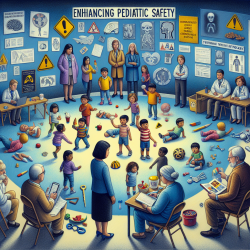Enhancing School-Based Drug Prevention with Trauma-Informed Approaches
In the realm of school-based interventions, the Michigan Model for HealthTM (MMH) has long stood as a beacon of evidence-based practice aimed at reducing drug use among students. However, a persistent challenge remains: how to adapt these interventions to meet the nuanced needs of students, particularly those exposed to trauma. The recent research study titled "Michigan Model for HealthTM Learning to Enhance and Adapt for Prevention (Mi-LEAP)" sheds light on this issue by comparing Enhanced Replicating Effective Programs (REP) with standard implementation methods.
The Importance of Trauma-Informed Approaches
Trauma exposure among youth is alarmingly high, with approximately 30.5% of youth aged 12-17 experiencing multiple Adverse Childhood Experiences (ACEs). These experiences, which include abuse, neglect, and exposure to violence, can significantly impact a child's mental health and increase the risk of substance abuse. Therefore, incorporating trauma-informed approaches into school-based prevention programs is not just beneficial but essential.
Enhanced REP: A Tailored Implementation Strategy
The Mi-LEAP study introduces an Enhanced REP strategy that integrates trauma-informed approaches into the MMH curriculum. This strategy involves customizing curriculum materials, providing tailored training for teachers, and offering ongoing support through facilitation. By doing so, the program aims to enhance the fit between the intervention and the students' needs, thereby improving fidelity and effectiveness.
Key Findings and Implications for Practitioners
The study's findings underscore the importance of tailoring interventions to meet the specific needs of trauma-exposed students. Practitioners are encouraged to consider the following strategies:
- Customize Curriculum Materials: Adapt materials to include trauma-informed content that resonates with students' experiences.
- Provide Tailored Training: Equip teachers with the skills and knowledge to deliver trauma-informed interventions effectively.
- Offer Ongoing Support: Facilitate regular meetings and support sessions to address barriers and enhance program delivery.
By implementing these strategies, schools can improve the effectiveness of their drug prevention programs and better support students who are at risk due to trauma exposure.
Encouraging Further Research
While the Mi-LEAP study provides valuable insights, it also highlights the need for further research. Practitioners are encouraged to engage in ongoing evaluation and adaptation of their programs to ensure they remain responsive to the evolving needs of students. Additionally, conducting pilot studies of implementation strategies can provide critical information for designing and testing effective interventions.
To read the original research paper, please follow this link: Michigan Model for HealthTM Learning to Enhance and Adapt for Prevention (Mi-LEAP): protocol of a pilot randomized trial comparing Enhanced Replicating Effective Programs versus standard implementation to deliver an evidence-based drug use prevention cur.










